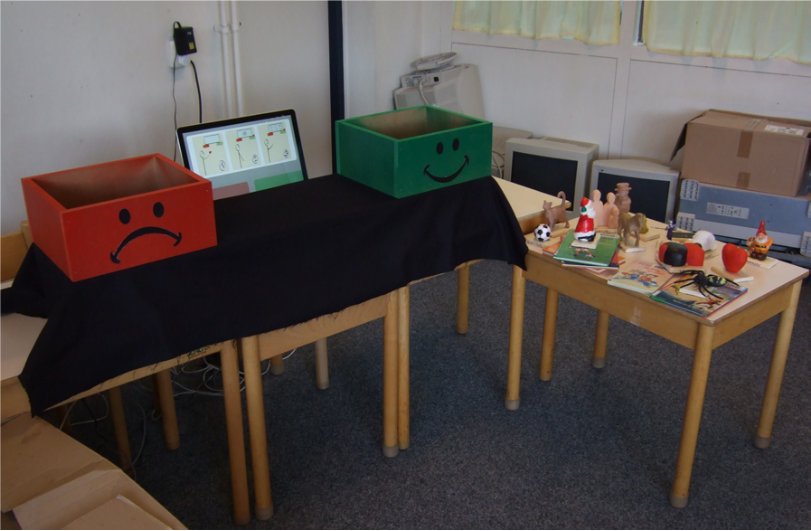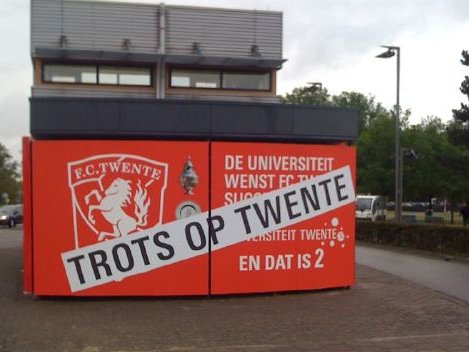The university's main entrance honours the FC
Category: Photos
CAES & Co football team
Guest lecture by Peter Dickman from Google
Friday 26 November, Peter Dickman from Google will talk about Google's infrastructure. The lecture will start at 10:30 h. (so 15 minutes earlier than usual) in RA-1501.
This a rapid overview of the approach Google uses to develop and offer global products. I will briefly (and somewhat superficially) cover the whole of our infrastructure from physical systems, such as the data centers, through the software stack to our software development methodology and the corporate engineering culture that both builds and utilizes the infrastructure.
Peter Dickman is an engineering manager in Google's main European engineering centre in Zurich. He is involved with both the internals of the Google search engine and projects to protect user data in Google's systems. Prior to working at Google, Peter was an academic in the UK, researching large-scale distributed systems (though on arrival at Google he discovered what large really meant).
Tangible Information Retrieval for Children
by Michel Jansen, Wim Bos, Paul van der Vet, Theo Huibers and Djoerd Hiemstra
Despite several efforts to make search engines more child-friendly, children still have trouble using systems that require keyboard input. We present TeddIR: a system using a tangible interface that allows children to search for books by placing tangible figurines and books they like/dislike in a green/red box, causing relevant results to be shown on a display. This way, issues with spelling and query formulation are avoided. A fully functional prototype was built and evaluated with children aged 6-8 at a primary school. The children understood TeddIR to a large extent and enjoyed the playful interaction.

TeddIR in the set-up used during evaluation.
TeddIR will be presented at 9th International Conference on Interaction Design and Children, Barcelona June 9-11, 2010.
Russian Summer School in Information Retrieval
I will give several lectures on information retrieval modeling at the Russian Summer School in Information Retrieval, which will be held September 11-16, 2009 in Petrozavodsk, Russia. The main audience of the school is graduate and post-graduate students, young scientists and professionals who have experience in development of information retrieval applications. The school will host approximately 100 participants.
Information Retrieval Modeling
There is no such thing as a dominating model or theory of information retrieval, unlike the situation in for instance the area of databases where the relational model is the dominating database model. In information retrieval, some models work for some applications, whereas others work for other applications. For instance, vector space models are well-suited for similarity search and relevance feedback in many (also non-textual) situations if a good weighting function is available; the probabilistic retrieval model or naive Bayes model might be a good choice if examples of relevant and nonrelevant documents are available; Google's PageRank model is often used in situations that need modelling of more of less static relations between documents; region models have been designed to search in structured text; and language models are helpful in situations that require models of language similarity or document priors; In this tutorial, I carefully describe all these models by explaining the consequences of modelling assumptions. I address approaches based on statistical language models in great depth. After the course, students are able to choose a model of information retrieval that is adequate in new situations, and to apply the model in practice.
More information at RuSSIR 2009.
Pathinder meeting in Dagstuhl
Pavel Serdyukov wins ECIR best student paper award
Great news: Yesterday, Pavel Serdyukov won the best student paper award at the European Conference on Information Retrieval (ECIR) in Glasgow for his paper Modeling documents as mixtures of persons for expert finding. The award includes a check of $ 1200 sponsored by Yahoo.
ECIR tutorial slides on-line
I enjoyed giving the advanced language modeling tutorial at the European Conference on Information Retrieval (ECIR). The slides are now availble for download below.
Welcome to the Database Group
UT-kring futsal team at christmas tournament
There is more to life than computer science: See below, thanks to Wim Brilman a photo of our noble UT futsal team at the yearly christmas tournament. We won one game, one draw and lost three: We ended fifth in a group of six teams. Could be worse 😉







